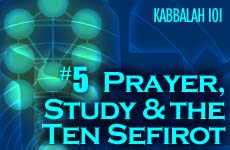 Iran’s Attack on Israel
Iran’s Attack on Israel


3 min read
Prayer lifts us above a fragmented world, where we turn our focus to only One God, whose many attributes make up one cohesive union.
In previous articles we discussed the idea of Ten Sefirot - the ten attributes/manifestations of God - as being a cohesive union. We focused on the underlying unity of the One God and how the understanding of the Ten Sefirot differs from polytheism.
What is a practical application of this distinction?
An answer might be found in the Sifri, a primary form of the Oral Law:
Who is a God as great as our God who answers us whenever we call/pray out to Him ... To Him, but not to His attributes (Sefer Sifri Vaeschanan).
Thus, we have an important restriction to the use of Sefirot. Although we may know about those Sefirot, and we may study how they function, still we may not pray to them.
Why?
The answer lies in the distinction between prayer and study.
PRAYER VS. STUDY
Imagine a circle with a dot at its center. When one stands at the rim and looks towards the center, he is made aware of the fact that despite the multitude of points on the outer rim, they all focus at the center. But when one stands at the center facing outwards, he becomes aware of the opposite phenomena - that despite the center being one point it radiates out into many directions.
In prayer, a person stands on the outer perimeter of the circle, touching diverse areas of life.
Prayer may be likened to the first case. The person stands on the outer perimeter of the circle, touching diverse areas of life. He prays for wealth, health, wisdom, etc. He focuses towards the center - the Almighty - realizing that there is one source for all of life's diverse needs. He is addressing the ultimate source - God.
Study may be likened to the second case, where the person stands at the center facing the perimeter. Study is a process whereby we take God's word, and break it into components, so that we can understand it and properly apply it. God's word is one, but if we apply it to various situations it takes on the many hues and flavors of the particular applications.
ONE WORD, MANY DEEDS
In order to understand God's word, we had to dissect God's deeds into ten components - the Ten Sefirot. In order to be properly applied, God's singular will had to be diversified into 613 different applications, so that every aspect of human life could be illuminated by His lamp. Study may be understood in the verse in Psalms: "God spoke once, but we heard twice."
God's singular will had to be diversified to illuminate every aspect of human life.
But, when it comes to prayer, we proclaim daily as one of the fundamentals of faith: "I believe, with a full belief, that only to God Himself is it appropriate to pray" (Ani Maamin Proclamation). Our prayers must be directed to the all-encompassing Almighty, not to parts, pieces, manifestations, or messengers.
The reason why in our study we see differentiation and plurality of the divine within our world is due to our fragmented, finite comprehension. But when we come to pray and we submit ourselves to God, we turn our attention away from the fragmentation and towards God as the absolute, all-encompassing root of creation.
We become aware that at the center-point is One, and only One.
